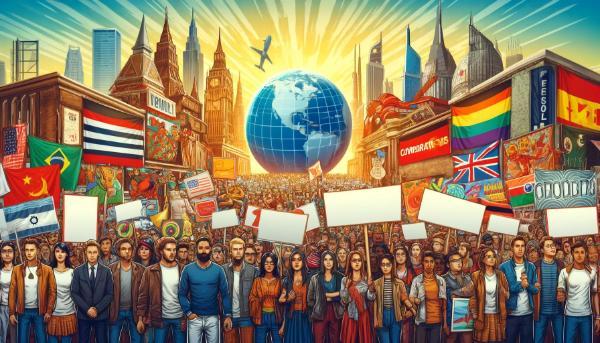It seems there is an overwhelmingly prevalent current in human opinion urging to fight against globalization.
Not surprising. Human has always shown to be reluctant to change throughout history. Especially when change concerns the fundamental structure of society – for some reason – perhaps because it is a kind of blueprint for the fundamental nature of Self – the vast majority of humans has always fought fiercely against the historical and evolutionary phenomenon of increasing combination.
That’s why myriads of heroes of myriads of different cultures strove strenuously against the rise of the National State throughout the past two centuries; and the Free Cities did the same against road-building Kingdoms and Empires; and the Roving Bushmen did against the popping-up Cities and their contagious rafts occupying the riverbanks; and our semi-simian/semi-humanoid ancestors did against the sapient proto-Bushmen. And probably that’s also why it took such a colossal amount of time for Cells to give up their individuality and combine into the sophisticated Cell-Networks we now know as plants and animals.
Innumerable heroes have withered in the fight against the evil new orders which arose throughout history. But what is evil? Well… everything new seems to be regarded as something evil… until it becomes old and sanctified.
Many an evil blasphemer were crucified, staked, or burnt alive by the Romans and the Catholic Church, only to be later regarded as Saints by the creeds they helped to establish.
European peasants readily lurked in the bush and stoned the evil locomotives in the 19th century; but nowadays hardly a single one would saddle up a mule rather than catching the next train to town.
Many people in Africa, still nowadays, will curse you off – believing that you steal away a part of their soul or something – if you try to take a picture of them.
Many evil followers of thinkers like Voltaire, Rousseau, and Diderot lost their heads in the strife against Monarchy; but after their comrades placed the theretofore sacred head of Luis XVI under the guillotine, they became sacred themselves and are today regarded as heroes of our ideal Humanistic-Democratic-Liberal societies.
Many individuals and institutions are today ready to valiantly fight the New World Order to the bitter end. Some of them speak about erecting walls and barbed-wire fences to keep those bloody immigrants out of their holy fatherlands. Some others speak about taking to the streets; protest and make up Molotov cocktails; burn banks, headquarters of multi-national companies, and other symbols of global power and wealth to the ground.
Some of them are old. Some of them are young. Some of them are rich. Some of them are broke. Supporters of the Neo-Nazi European movement dream about demolishing the villainous EU and reinstating the aforetime sovereign, powerful, pure National State. European Anarchist youth dream about doing the same thing, but transforming Europe into a loose federation of Catalonia-style collectives instead. Many other – ideologically inclined to anywhere in between – people have adopted the same motto: Globalization = Evil. But all of them are equally conservative, naive, and inadequately history-educated… Can the hammer stop the hand? How to confront the torrent?
What is Globalization?
I suppose ‘the integration of all humanity into one single network of cooperation’ will do for a definition.
In fact, all history of mankind could be summarized as the history of establishing and expanding such networks of cooperation… From the astounding large (from the point of view of an ape) Paleolithic bands joining forces to take down a mammoth and sit by the bonfire making up and sharing their stories… To the agriculturalists coming together in the thousands to build cities and devising scripts and bureaucracy to manage them… To the mighty Empires connecting thousands of cities across rivers, seas, and land… Despite the strenuous resistance of general opinion, there is an obvious indomitable tendency towards ever-increasing combination and interconnectivity amongst the human kind.
And where are we today?
You are now reading this article… Take a second and think about how many individuals have cooperated for you to be able to read this article: All the many programmers who have contributed to writing every piece of code that is needed for the Internet and its applications to be functional… All the many workers of all the many different factories in China and across the world that have cooperated to create all the different parts that this device on which you are now reading is made up of… All the miners and whoever else that have extracted the raw materials for all these parts to be made… The sailors, the truck drivers, and all others who have taken care of the logistics for transporting all these different raw materials and parts from place to place… The scientists who laid down the theoretical foundation for all these things to be possible in the first place… The farmers, herdsmen, and fishermen who make it possible for all the rest to be occupied with anything else other than feeding themselves… Essentially, humanity in nearly its entirety has contributed: you being able to read this article is the result of fully global cooperation.
Behold Globalization!
Globalization is neither a danger, nor a hope, nor a dystopia, nor a utopia, nor any other kind of future prospect. Globalization is the present. You are able to travel to the antipode of the globe almost as fast as the globe rotates. You are able to send and receive information to and from any person in any part of the globe instantaneously. People from all over the world are seamlessly cooperating with each other.
We run a global economy. Due to that, we face steadily more and severer global problems. And we urgently need effective global institutions in order to tackle these problems. Politics have always been and will always be supplementary and posterior to the economy. Whereas the economy has shown to be a very flexible and progress-embracing operation, the indispensable administrative and regulatory (sociopolitical) mechanisms which are needed to supplement it are stiff. Especially nowadays, when economic progress is accelerating by inconceivable magnitudes, the speculating on how the society will keep pace with it is pretty hard not to be pessimistic.
Notwithstanding whatever adamantine resistance they have managed to muster, old institutions did eventually collapse before the urging march of new economies. This seems to have held true infallibly throughout history. Although, nothing really tells us that it must necessarily always remain true.
Especially when national governments and armies – or any other sorts of obsolete, local-focused establishments – have the power to command things like chemical, biological, and nuclear weapons… there is good ground to believe that their last stand could be unprecedentedly explosive.
To fight against globalization… This is the danger.

